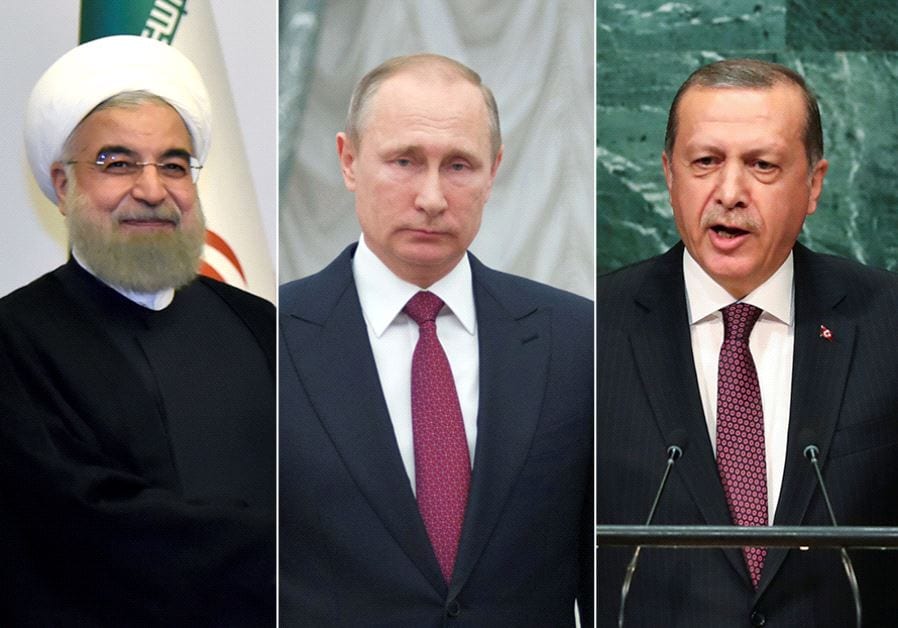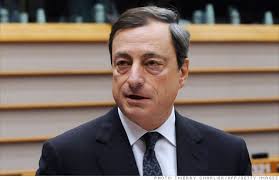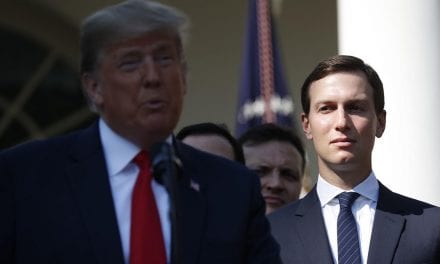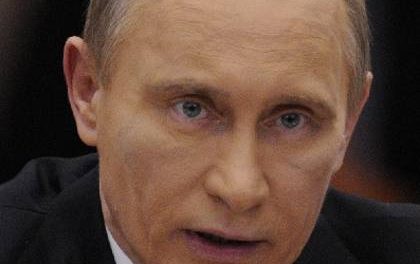By Ahval
The presidents of Iran, Russia, and Turkey met last week in the Black Sea resort of Sochi to discuss Syria, a summit that marked the increasing convergence of national interests between these regional powers, reported U.S. magazine National Interest.
This emerging alliance provides a counterpoint to the rise of Chinese power in the East and a changing United States and Europe in the West, particularly as U.S. forces prepare to pull out of Syria and Afghanistan.
“Iran, Russia and Turkey have different objectives in Syria, but they also have overlapping goals in the rest of Eurasia, run the risk of becoming economic extensions of China, and all three have strained relations with the West,” Scott B. MacDonald, chief economist for the credit research firm Smith’s Research and Gradings, wrote in an analysis for the conservative publication on Monday.
Washington and the EU have imposed economic sanctions on Russia for its annexation of Crimea in 2014, and are considering new sanctions in response to Moscow’s aggression against Ukraine in the Sea of Azov. The Trump administration has re-imposed sanctions against Iran and briefly imposed sanctions against top Turkish officials.
Turkey remains a major trade partner for Europe, but relations are strained. Ankara’s application for EU membership, filed in 1987, has gone nowhere mainly due to concerns over the impact of a large Muslim country entering the bloc, said MacDonald.
“The increasingly autocratic nature of President (Recep Tayyip) Erdoğan’s government has also been a point of friction. At the same time, there was irritation in Turkey over what was deemed to be a slow show of support by the West when the Erdoğan government narrowly averted a coup attempt in 2016,” wrote MacDonald. “Consequently, Turkey looked east, seeking to gain greater influence in the Middle East and Central Asia.”
As a result, Russia and Iran assumed greater importance from a trade and investment perspective. Turkey also seeks to play a role in the parts of Eastern Europe that still have Muslim minorities, such as Albania, Bulgaria, and Bosnia, and has been more willing to consider the purchase of Chinese and Russia arms, which has strained relations with NATO. Some voices have even suggested that Turkey should leave NATO, according to MacDonald.
China is another force that has pushed Iran, Russia and Turkey closer, flexing its economic and political muscles as it seeks to revive the old Silk Roads that linked China and Europe in one vast transportation and trade network.
Turkey has been a focus of Chinese investment, attracting around $15 billion since 2005, according to MacDonald, including a Chinese firm’s September 2015 purchase of Turkey’s third largest port for nearly a billion dollars. Chinese companies view Turkey as a logistics hub and a possible gateway to Europe and Africa.
A point of friction is China’s heavy-handed treatment of the Uighurs, a Muslim minority. Just last week, Ankara urged China “to respect fundamental human rights of the Uighur Turks and shut down concentration camps.”
But the main factor that has driven Iran, Russia, and Turkey together is Syria, where efforts began in 2011 to overthrow the Bashar Assad dictatorship.
“Although the three powers were initially at odds over the Syrian conflict, with Turkey shooting down a Russian military aircraft in 2015, realpolitik brought Ankara, Moscow and Tehran together. The common interest in Syria is the need for political stability and getting the U.S. and, for that matter, the smaller French and British contingents, out of the Middle Eastern country, while making certain that the Islamic State does not make a comeback,” wrote MacDonald.
Turkey’s main concern is that the Syrian Kurds could stir Turkish Kurds into a rebellion to seek their own independent state. “Fears of a greater Kurdistan have loomed over the region for a long time and were given a more tangible feel by the seizure of autonomy by Iraq’s Kurds, later followed by Syria’s Kurds. Turkey wants a buffer zone between its southeast regions and the Syrian Kurds,” MacDonald added.
At the February 14 summit the goals were getting the Americans out of eastern Syria and finding a way for the Syrian government to re-establish control over the Kurdish region. This is likely to be a challenging exercise, but the three powers appear to have a preference for talk, rather than fight, according to MacDonald.
“Although the three-nation summit did not get much press in the West, its emergence is a signal, albeit a quiet one, that Eurasia’s geopolitical landscape is undergoing major changes as traditional rivals are more inclined to work together to achieve common goals in an anti-Western, pro-autocratic and quite possibly a cautious-toward-China policy mix,” wrote MacDonald. “This is significant as Eurasia appears to be where the major geopolitical drama of the twenty-first century is playing out, a massive chessboard with plenty of moving pieces.”



















